most of 与lots of用法
alotof、lotsof、an...
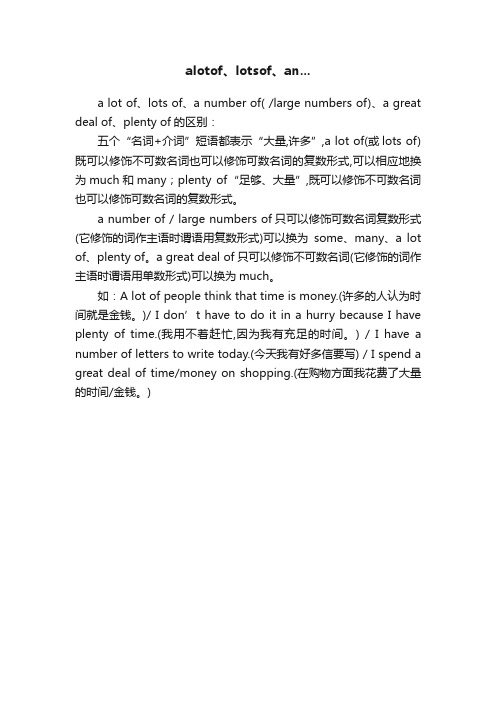
alotof、lotsof、an...
a lot of、lots of、a number of( /large numbers of)、a great deal of、plenty of的区别:
五个“名词+介词”短语都表示“大量,许多”,a lot of(或lots of)既可以修饰不可数名词也可以修饰可数名词的复数形式,可以相应地换为much和many;plenty of“足够、大量”,既可以修饰不可数名词也可以修饰可数名词的复数形式。
a number of / large numbers of只可以修饰可数名词复数形式(它修饰的词作主语时谓语用复数形式)可以换为some、many、a lot of、plenty of。
a great deal of只可以修饰不可数名词(它修饰的词作主语时谓语用单数形式)可以换为much。
如:A lot of people think that time is money.(许多的人认为时间就是金钱。
)/ I don’t have to do it in a hurry because I have plenty of time.(我用不着赶忙,因为我有充足的时间。
) / I have a number of letters to write today.(今天我有好多信要写) / I spend a great deal of time/money on shopping.(在购物方面我花费了大量的时间/金钱。
)。
英语数量短语作主语时主谓一致的用法

英语数量短语作主语时主语一致的用法1. 表时间长度、钱数、速度等的词组作主语时,通常将其视为整体,谓语动词用单数。
如:Twenty years is a long time. 20年是很长的时间。
Ten dollars is all I have left. 我只剩下10美元。
2. “分数(百分数)+of+名词”结构作主语时,谓语动词的数与其中名词的数保持一致。
如:About 20 percent of the pupils were absent that day. 那天大约有20%的学生未到。
Three-fourths of the surface of the earth is covered by sea. 地球表面的四分之三是海。
注:在现代英语中,有时即使该结构中的名词为复数,其谓语也可用单数(即将其视为整体)。
如:Over eighty per cent of families own [owns] a televisio n. 百分之八十以上的家庭已拥有电视机。
3.“one in [out of]+复数名词”作主语时,谓语动词通常用单数。
如:Only one in ten students has passed the examination. 只有十分之一的学生通过了考试。
One out of twelve bottles was broken. 每12个瓶子中有一个破了。
注:在非正式文体中有时也用复数谓语。
如:Nationwide, one in five adults are illiterate. 就全国范围而言,五个成年人中有一个是文盲。
4. “all of (some of, none of, half of, most of, lots of, p lenty of)+名词”作主语时,谓语动词的数与其中名词的数保持一致。
如:Half of the apple is bad. 这个苹果有一半是坏的。
lotsof的用法

lotsof的用法"Lots of"的用法非常广泛,以下是关于"lots of"的用法,超过1200个字的解释。
1. Lots of + 可数名词复数形式:用来表示数量多的物体或人。
- There are lots of books on the shelf.- Lots of people came to the party.2. Lots of + 不可数名词:用于表示大量的不可数名词。
- She has lots of money.- I have lots of homework to do.3. Lots of + 不定代词:用来表示很多的不确定的人或物体。
- There were lots of people at the store today.- Lots of things need to be done before the deadline.4. Lots of + of + 代词:用来表示大量的其中一种事物。
- I have lots of friends.- She has lots of experience.5. Lots of + 性质词:用来描述其中一种属性或性格有很多的人或物体。
- There are lots of kind people in this world.- I have lots of patience.6. Lots of + 动词:用来描述一个动作或行为的频率。
- He has lots of energy.- She talks lots.7. Lots of + 时间状语:用来表示一个时间段有很多的事情要做。
- Lots of work needs to be done before the deadline.- I have lots of appointments today.8. Lots of + 地点状语:用来表示一些地点有很多的人或物体。
lots、alot、lotsof和alotof的区别用法

lots、alot、lotsof和alotof的区别用法a lot of用法你们都了解了吗?今日我给大家带来了a lot of用法,盼望能够给关心到大家,下面我就和大家共享,来观赏一下吧。
lots、a lot、lots of 和a lot of 的区分用法一、lots of 和a lot of 意思一样,意为“很多”,表示量很大,但是没必要指明量的多少,多用在比较不正式的谈话或是写作中(正式的用mang 或much),后面跟可数名词和不行数名词,谓语的单复数依据后面接的名词来变化,例如:可数名词:A lot of people went to the game.许多人去看了竞赛。
Lots of people went to the game.许多人去看竞赛。
A lot of computers are needed at schools. ---- computers 为复数,谓语用复数学校需要许多电脑。
Lots of computers are needed at schools.学校需要许多电脑。
不行数名词:A lot of snow falls in winter.----snow为不行数名词,谓语用单数冬天下了许多雪。
Lots of snow falls in winter.冬天下了许多雪。
A lot of water is wasted.许多水被铺张了。
Lots of water is wasted.大量的水被铺张了。
一般状况下,lots of 和a lot of 可以通用,相比于a lot of,lots of 更为不正式二、a lot 当作副词,意为“常常,许多”,例如:I like basketball a lot.我特别喜爱篮球。
Shes a lot happier now than she was.她现在比以前欢乐多了。
I dont go there a lot anymore.我不再常常去那里了。
most of和most的区别用法

most of和most的区别用法摘要:1.most of 与most 的区别2.most of 的用法3.most 的用法4.举例说明5.总结正文:在我们日常的英语学习中,most of 和most 这两个短语经常会被混淆。
尽管它们都表示“大多数”,但在用法上却存在一定的差异。
下面我们将详细解析这两个短语的区别及其用法。
首先,我们来了解most of 这个短语。
most of 意为“(数量)超过一半”,后面通常接名词的复数形式。
例如:“Most of the students in our class are interested in sports.”(我们班的大部分学生对运动感兴趣。
)在这个例子中,most of 表示的是“大部分学生”,这里的“大部分”指的是超过一半的学生。
接下来,我们看看most 的用法。
most 作为形容词,表示“大多数的”,后面接名词的单数形式。
例如:“Most of the books in the l ibrary are about literature.”(图书馆的大部分书籍都是关于文学的。
)在这个例子中,most 表示的是“大多数的书籍”,这里的“大多数”指的是相对于其他主题的书籍,数量上占据主导地位。
此外,most 还可以用作副词,表示“最多”,“最多的是”。
例如:“She has done most of the work herself.”(她自己完成了大部分的工作。
)这里的“大部分”指的是相对于其他人完成的工作量。
通过以上解析,我们可以清楚地了解到most of 和most 的区别及用法。
在实际应用中,我们需要根据语境选择合适的短语,避免混淆。
总的来说,most of 强调数量上的超过一半,而most 强调的是在某一范围内的主导地位。
总结一下,掌握most of 和most 的区别对我们更好地运用英语词汇具有重要意义。
lo ots a lot a lots loof lots of a lot of a lots of的区别
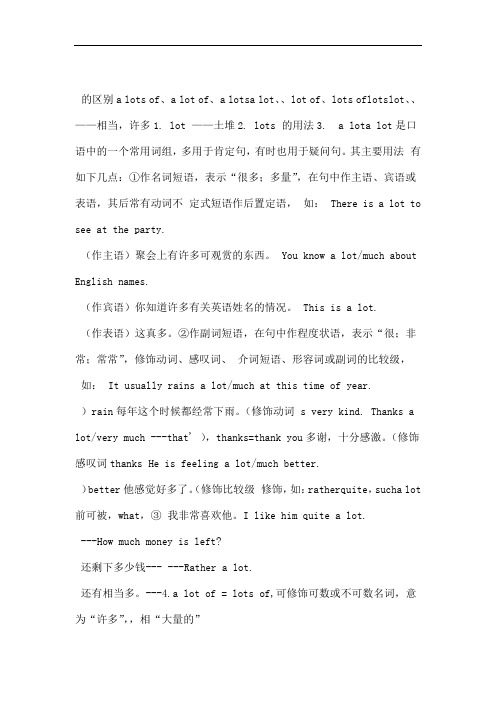
的区别a lots of、a lot of、a lotsa lot、、lot of、lots oflotslot、、——相当,许多1. lot——土堆2. lots的用法3. a lota lot是口语中的一个常用词组,多用于肯定句,有时也用于疑问句。
其主要用法有如下几点:①作名词短语,表示“很多;多量”,在句中作主语、宾语或表语,其后常有动词不定式短语作后置定语,如:There is a lot to see at the party.(作主语)聚会上有许多可观赏的东西。
You know a lot/much about English names.(作宾语)你知道许多有关英语姓名的情况。
This is a lot.(作表语)这真多。
②作副词短语,在句中作程度状语,表示“很;非常;常常”,修饰动词、感叹词、介词短语、形容词或副词的比较级,如:It usually rains a lot/much at this time of year.)rain每年这个时候都经常下雨。
(修饰动词s very kind. Thanks a lot/very much ---that'),thanks=thank you多谢,十分感激。
(修饰感叹词thanks He is feeling a lot/much better.)better他感觉好多了。
(修饰比较级修饰,如:ratherquite,sucha lot 前可被,what,③我非常喜欢他。
I like him quite a lot.---How much money is left?还剩下多少钱------Rather a lot.还有相当多。
---4.a lot of = lots of,可修饰可数或不可数名词,意为“许多”,,相“大量的”通常用于肯定句,否定句中一般用。
a lot, a lot of, lots ofmuchmany 当于或,如:much或manys a lot of work to do and a lot of people have been sent there. There'有许多事情要做,许多人已派去那里了。
人教版八年级英语上unit 1-6重点短语
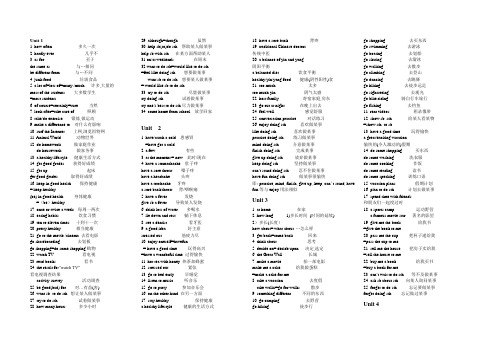
Unit 11. how often 多久一次2. hardly ever 几乎不3. as for 至于the same as 与…相同be different from 与…不同4. junk food 垃圾食品5. a lot of=lots of=many /much 许多,大量的most of the students 大多数学生=most students6. of course=certainly=sure 当然7. look after=take care of 照顾8. take/do exercise 锻炼,做运动9. make a difference to 对什么有影响10. surf the Internet 上网,浏览因特网11. Animal World 动物世界12. do homework 做家庭作业do housework 做家务事13. a healthy lifestyle 健康生活方式14. get good grades 获得好成绩15. get up 起床get good grades 取得好成绩16. keep in good health 保持健康= keep healthy(be) in good health 身体健康=(be)healthy17. once or twice a week 每周一两次18. eating habits 饮食习惯19. ten to eleven times 十到十一次20. pretty healthy 相当健康21. go to the movie /cinema 去看电影go skateboarding 去划板go shopping=do some shopping购物22. watch TV 看电视23. read books 看书24. the result fo r“watch TV”看电视调查结果activity survey 活动调查25. be good(bad) for 对…有益(害)26. want sb. to do sth. 想让某人做某事27. try to do sth. 试着做某事28. how many hours 多少小时29. although=though 虽然30. help sb(to)do sth 帮助某人做某事help sb with sth 在某方面帮助某人31.on/at weekends 在周末32.want to do sth=would like to do sth=feel like doing sth 想要做某事want sb to do sth 想要某人做某事= would like sb to do sth33. try to do sth 尽量做某事try doing sth. 试着做某事try one’s best to do sth.尽力做某事34. come home from school 放学回家Unit 21. have/catch a cold 患感冒=have got a cold2. a few 有些3. at the moment = now 此时/现在4. have a stomachache 肚子疼have a sore throat 嗓子疼have a headache 头疼have a toothache 牙疼a sore back/throat 背/咽喉痛5. have a fever 发烧give sb a fever 导致某人发烧6. drink lots of water 多喝水7. lie down and rest 躺下休息8. see a dentist 看牙医9. a good idea 好主意.stressed out 筋疲力尽10. enjoy oneself=havefun= have a good time 玩得高兴=have a wonderful time 过得愉快11. hot tea with honey 热茶加蜂蜜12. stressed out 紧张13. go to bed early 早睡觉14. listen to music 听音乐15. go to party 参加音乐会16. on the other hand 在另一方面17. stay healthy 保持健康a healthy lifestyle 健康的生活方式18. have a sore back 背疼19. traditional Chinese doctors传统中医20. a balance of yin and yang阴阳平衡a balanced diet 饮食平衡healthy/yin/yang food 健康(阴性阳性)食21. too much 太多too much yin 阴气太盛22. host family 寄宿家庭,房东23. go out at night 在晚上出去24. feel well 感觉舒服25. conversation practice 对话练习26. enjoy doing sth. 喜欢做某事like doing sth 喜欢做某事practice doing sth. 练习做某事mind doing sth. 介意做某事finish doing sth. 完成某事give up doing sth. 放弃做某事keep doing sth. 坚持做某事can’t stand doing sth. 忍不住做某事have fun doing sth. 做某事很愉快即:practice, mind, finish, give up, keep, can’t stand, havefun等与enjoy用法相似Unit 31. at home 在家2. how long 1)多长时间(时间的延续)2)多长(长度)how about= what about …怎么样3. get back=come back 回来4. think about 思考5. decide on= decide upon 决定,选定6. the Great Wall 长城7. make a movie 拍一部电影make me a cake 给我做蛋糕=make a cake for me8. take a vacation 去度假take walks=go for walks 散步9. something different 不同的东西10. go camping 去野营go hiking 徒步行go shopping 去买东西go swimming 去游泳go boating 去划船go skating 去溜冰go walking 去散步go climbing 去登山go dancing 去跳舞go hiking 去徒步远足go sightseeing 去观光go bike riding 骑自行车旅行go fishing 去钓鱼11. rent videos 租录像带12. show sb. sth. 给某人看某物=show sth. to sb13. have a good time 玩得愉快a great/exciting vacation愉快的(令人激动的)假期14. do some shopping 买东西do some washing 洗衣服do some cooking 作饭do some reading 读书do some speaking 训练口语15. vacation plans 假期计划16. plan to do sth. 计划去做某事17. spend time with friends和朋友们一起度过时18. a sports camp 运动野营a famous movie star 著名的影星19. give me the book 给我书=give the book to me20. pass me the cup 把杯子递给我=pass the cup to me21. sell me the house 把房子卖给我=sell the house to me22. buy me a book 给我买书=buy a book for me23. can’t wait to do sth. 等不及做某事24. ask sb.about sth. 向某人询问某事25. forget to do sth. 忘记要做某事forget doing sth. 忘记做过某事Unit 41. how far 多远2.on weekends 在周末3.be ill in the hospital 生病住院4. a map in Chinese 中文地图5. speak Chinese 讲汉语6. thank you so much 这样感谢你7.don’t worry 不要担心8.means of transportation 交通方式9.aroundthe world 全世界in North America 在北美in other parts of the world在世界的其他地区10.at about six-thirty 在大约六点半11. walk to school 步行上学arrive at/ reach school=get to school到校12. the bus ride 公共汽车之行13. a number of=many 许多the number of ….的数量14. take the subway 乘地铁take a taxi 乘坐出租车take the/a bus 乘公共汽车take sb. to sp. 带某人到某处15.by bike/bus/subway/car/train乘坐…车go in one’s car 坐(某人的)车16. ride a bike 骑自行车17. want to do sth. 想做某事18. leave for 起程(动身)前往…19. a bus stop/station 公共汽车站a train station 火车站a subway station 地铁站a TV station 电视台20. have a quick breakfast 迅速吃早饭21. depend on=depend upon依靠,靠…决定22. the early bus 早班车Doing sth. takes sb. some time/ money. =It takes sb. some time/money to do sth.Unit 51. come to my party 来参加我的晚会come to one’s party 参加某人的聚会come over to 过来Come and join us. 来加入我们2. on Saturday afternoon 在周六下午3. have/take a piano lesson 上钢琴课4. go to the doctor 去看医生=see a doctorgo to the dentist 去看牙医5. too much homework 太多家庭作业6. Thanks for asking. 谢谢邀请Thanks a lot for the invitation多谢邀请7. have fun 玩得高兴8. go to the mall 去商业街9. baseball game 棒球比赛football match 足球比赛soccer practice 足球训练a science report 科学报告10. the day after tomorrow 后天11. study for a test 为考试而学习12. another time 下一次13. be on vacation 在度假期14. keep quiet 保持安静keep+形容词保持某状态keep+(sb.)+doing 使(某人)不停地做某事keep sth. 保存某物,饲养某物15. play tennis 打网球16. much too 太,过于too much 太多17.a culture club 文化俱乐部18. the whole day 整天19. be (go) on vacation 度假20. a birthday party 生日聚会21. look for 寻找22. I'd love to. 我愿意23. babysit his sister 临时照看他的妹妹24. find out 找到,弄清楚,查明25. join sb. 加入某人(的行列)26.”给某人打电话”的几种说法:call sb.(up), phone sb.(up),phone to sb., telephone sb.(up)telephone to sb., ring sb.(up),give sb. a ring, give sb.a phone,make a telephone (call) to sb.Unit61. in some ways 在某些方面in common 共用;共有in the middle of 在…中间in school 在校求学;在学校2. look the same 看起来一样look different 看起来不同3. talk to/with 和……谈话talk about 谈论4. enjoy going to the parties喜欢参加晚会5. more than 多于;超过6. on the other hand 另一方面(边)=on the opposite7. (not)as … as …(不)如…一样…the same as 与……一样8. be good at=do well in擅长;在…方面做得好be good with 和…相处得好=get on well with9. a swimming poor 游泳池10. make sb. do sth. 让某人做某事make me laugh 使我大笑11. most of 大多数12. around China=all over China 全中国13. opposite views 相反的观点14. be good with children 善待孩子们15. enjoy telling jokes 喜欢讲笑话16. teacher wanted 招聘老师17. stop talking 停止讲话stop doing sth. 停止做某事stop to do sth 接着做某事18. stay at home 呆在家19. use…to do…用…来做…20. after that 自那以后Review of units 1—61. begin/ start with 以…开始end with 以…结束2. swimming pool 游泳池3. all together 一起;总共。
[few和afew的区别]alot,lotof,alotsof,afew...区别及用法
![[few和afew的区别]alot,lotof,alotsof,afew...区别及用法](https://img.taocdn.com/s3/m/b15f97c577eeaeaad1f34693daef5ef7ba0d12e9.png)
[few和afew的区别]alot,lotof,alotsof,afew...区别及用法篇一: alot,lotof,alotsof,afew...区别及用法a lot是口语中的一个常用词组,多用于肯定句,有时也用于疑问句。
其主要用法有如下几点:一、作名词短语,表示“很多;多量”,在句中作主语、宾语或表语,其后常有动词不定式短语作后置定语,如:Sometimes we have very little snow, but sometimes there’s alot.有时我们这儿雪很少,有时却又很多。
There is a lot to see at the party. 聚会上有许多可观赏的东西。
He’s given her a lot to eat. 他给了她许多好吃的东西。
Y ou know a lot/much about English names. 你知道许多有关英语姓名的情况。
We see a lot of him these days. 这几天我们经常见到他。
This is a lot. 这真多。
二、作副词短语,在句中作程度状语,表示“很;非常;常常”,修饰动词、感叹词、介词短语、形容词或副词的比较级,如:It usually rains a lot/much at this time of year.每年这个时候都经常下雨。
Do you wear your new watch a lot? 你常戴你的新手表吗?Thanks a lot/very much ---that’s very kind.多谢,十分感激。
He is feeling a lot/much better. 他感觉好多了。
Y our room is a lot bigger than mine. 你的房间比我的大得多。
三、a lot前可被such,what,quite,rather修饰,如:I like him quite a lot. 我非常喜欢他。
限定词some,any,many,much,more,most,lots,few,

第二/三…
Canada, the second largest country in the world, lies in the north of America
little/few
little (less/least), few (fewer/fewest)
the most + n.(可数/不可数): 最多/最高的…
the most children最多的孩子
the most trouble最多的麻烦
most+ n.(可数/不可数):大多数的…
most people/most research
most of the +n.(可数/不可数) 大多数的
These?activities?occupied?most?of?her?time.这些活动占用了她大部分时间。
相关搭配:
the more…, the more…越…,就越...
The more I thought about it, the less I liked the idea
more and more + adj./ adv.越来越…
Changan?Avenue?is getting?more?and?more?beautiful.
相关搭配:
at most最多(反义词组at least至少)
It’ll take 20 minutes at the most.?
most 最、非常
Ilike English most/best.我最喜欢英语。
Thank you for a most interesting evening.
a lot of 和lots of 的用法
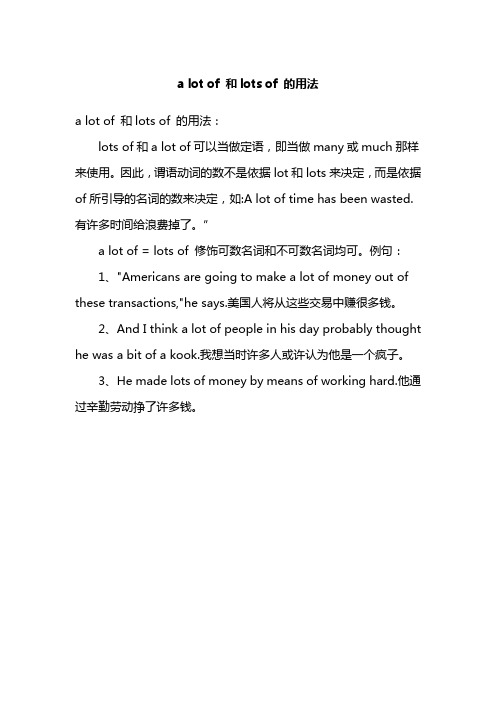
a lot of 和lots of 的用法
a lot of 和lots of 的用法:
lots of和a lot of可以当做定语,即当做many或much那样来使用。
因此,谓语动词的数不是依据lot和lots来决定,而是依据of所引导的名词的数来决定,如:A lot of time has been wasted.有许多时间给浪费掉了。
”
a lot of = lots of 修饰可数名词和不可数名词均可。
例句:
1、"Americans are going to make a lot of money out of these transactions,"he says.美国人将从这些交易中赚很多钱。
2、And I think a lot of people in his day probably thought he was a bit of a kook.我想当时许多人或许认为他是一个疯子。
3、He made lots of money by means of working hard.他通过辛勤劳动挣了许多钱。
a lot of 与lots of的用法
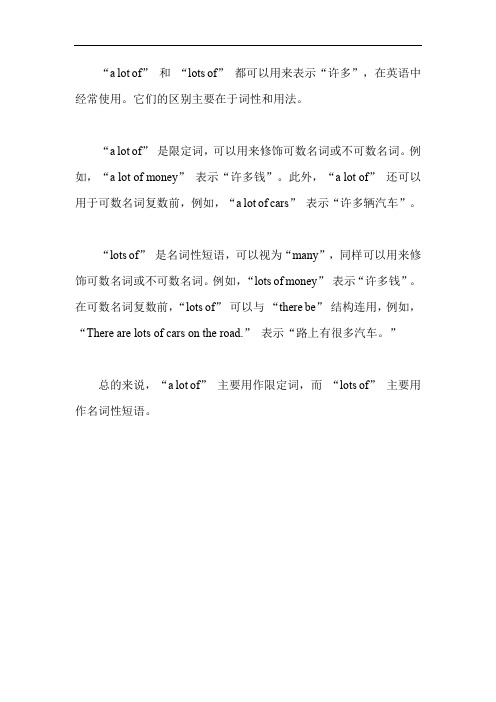
“a lot of”和“lots of”都可以用来表示“许多”,在英语中经常使用。
它们的区别主要在于词性和用法。
“a lot of”是限定词,可以用来修饰可数名词或不可数名词。
例如,“a lot of money”表示“许多钱”。
此外,“a lot of”还可以用于可数名词复数前,例如,“a lot of cars”表示“许多辆汽车”。
“lots of”是名词性短语,可以视为“many”,同样可以用来修饰可数名词或不可数名词。
例如,“lots of money”表示“许多钱”。
在可数名词复数前,“lots of”可以与“there be”结构连用,例如,“There are lots of cars on the road.”表示“路上有很多汽车。
”
总的来说,“a lot of”主要用作限定词,而“lots of”主要用作名词性短语。
英语“许多”用法及表达

●巩固练习● 1.__________student failed in the test. A. Many B. Many a C. Quite a little D. A large quantity of 2.__________ money has been spent on the environmental protection. A. A great deal B. A great deal of C. A lot D. Quite a few 3. A large quantity of patients __________ sent to the hospital at once. A. have been B. has C. were D. was 4. __________ the people are against going to Sydney,so they have to give it up. A. Most of B. A large number of C. The number of D. Many
• 注意 many/most与many of/most of的区别。 many/most后直接接名词的复数形式,意义为“许 多……”;而many of/most of后要接定冠词the+名 词的复数形式,意义为“……中的许多”。如: (1)There are 35 boys in our class. Most boys are from the countryside. 我们班共有35个男孩子,许多的男孩子都来自农村。 (2)There are 35 boys in our class. Most of the boys are from the countryside. 我们班共有35个男孩子,这些男孩子中的许多都来 自农村。
lot of 与lots of的用法

lot of 与lots of的用法
lot of和lots of都表示很多、大量的意思,它们都可以用作不可数名词的修饰词,意思是很多的、大量的。
不过,lot of与lots of在用法上还是有一些细微的区别的。
首先,就是lot of是指一个客观数量很多,但是具体多少不明确的情况,它强调量。
Lots of 是表示一个相当数量的意思,它强调数量,可以理解为非常多,也就是超出了某
一定量,可以理解为很多、相当多。
其次,在书面语中,lot of不能表示“很多”,但可以表示“许多”,它有时也可以被替换成plenty of;lots of表示“很多”,在书面中,常常表达“大量”的意思,和plenty of意思同样,常用来表达“很多的、足够的”的意思,在书面语中,lots of和plenty of可以相互替换使用。
再者,lot of指的是一大群;lots of指的是一小群,从句意上来说,lot of指的是更偏重在较多的情况,lots of指的是更偏重在较少的情况,例如:
A lot of people in the city are looking for jobs.
这个城市有很多人在找工作。
聚会上有很多人。
这里可以看出,lot of用在“许多”的意思,lots of用在“许多”的意思,在同视
觉察觉“很多”的情况里,它们都能满足需要,表达的都是“很多的”的意思。
最后,lot of强调量,lots of强调数量,它们可以简单地理解为lot of是指较少
的数量,lots of是指较大的数量,它们在表达多少时,在书面语当中,Lot of只能表示“许多”,而lots of可以表示“很多”。
a lot of与lots of的用法

a lot of与lots of的用法
使用方法不同:
lot of和lots of一般用在名词前,而a lot是用在动词+名词+a lot。
但是lot of、lots of和a lot在中文意思上是区别不大的,都表示比较多。
两者采用的场合相同:
lot of通常作为书面用语,在正式的场合里使用;lots of比较口语化,用在比较口
语的场合中,一般是be动词加上lots of再加上情态动词,这样的形式出现较多。
两者所润色的词语相同:
lot of除了可以修饰可数名词也可以修饰不可数名词,lots of只能修饰可数名词。
用法相同:
a lot表示许多,可修饰可数名词,也可以修饰不可数名词,与many和much相同,a lot of作可数名词时表示一批,某一批人,有单复数形式,a lot不可作状语,修饰动词去。
侧重点相同:
lot of修饰动词,有副词性,可用作状语,也具有名词性,可作宾语等,a lot of
修饰名词,有形容词性,可用作定语修饰可数名词复数或者是不可数名词。
名校版英语语法考点解析lots of和amounts of 用法
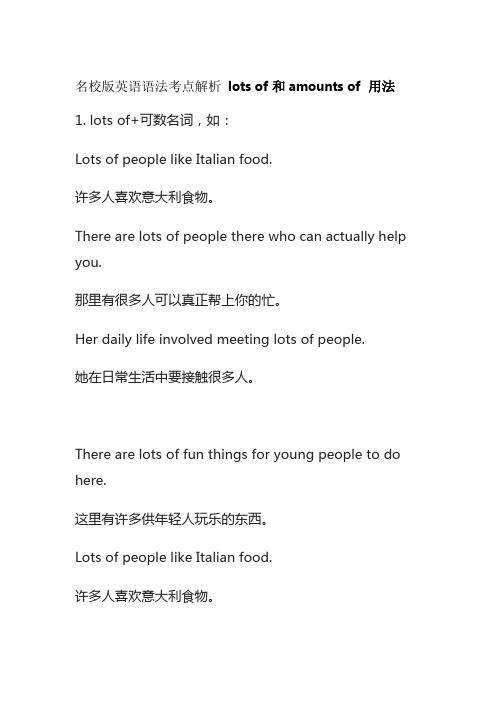
名校版英语语法考点解析lots of和amounts of 用法1. lots of+可数名词,如:Lots of people like Italian food.许多人喜欢意大利食物。
There are lots of people there who can actually help you.那里有很多人可以真正帮上你的忙。
Her daily life involved meeting lots of people.她在日常生活中要接触很多人。
There are lots of fun things for young people to do here.这里有许多供年轻人玩乐的东西。
Lots of people like Italian food.许多人喜欢意大利食物。
There are lots of Italian restaurants dotted around London.伦敦到处都有意大利餐馆。
Of course there were lots of other interesting things at the exhibition当然,展览上还有很多其他有趣的展品。
2. lots of+不可数名词,此时谓语动词用单数;如:There was lots of food left over.饭菜剩下了不少。
There's lots of money about these days for schemes like this.近来这类计划资金充足。
There is lots of reading in class.课上要进行大量的阅读。
3. amounts of+不可数名词,谓语动词用复数,如:Large amounts of money were spent on the bridge.这座桥花费了大量的钱。
We import huge quantities of oil each year.我们每年进口大量石油。
most of 名词定语从句

most of 名词定语从句
"Most of"是一个用来表示数量或比例的短语,通常用来修饰可
数名词或不可数名词。
在名词定语从句中,"most of"可以用来修饰
先行词,从而对其进行进一步的描述。
例如,我们可以说,"Most of the books that are on the shelf belong to the library." 这句话中,"most of"修饰先行词"books",而名词定语从句"that are on the shelf"进一步描述了
这些书的情况。
另外,"most of"也可以用在不可数名词上,比如,"Most of
the water that is in the bottle is cold." 这里,"most of"修
饰先行词"water",名词定语从句"that is in the bottle"进一步
说明了水的情况。
总的来说,在名词定语从句中,"most of"可以用来修饰先行词,使句子更加详细和具体。
这样的结构可以帮助我们更清晰地表达想
要传达的信息。
lotsof后面加什么名词

lotsof后面加什么名词
lots of后面可以接可数名词和不可数名词。
lots of所修饰的名词后面的动词应用单数还是复数形式,则看名词本身的可数或不可数性而定,与lots of无关。
例句:Lots of children have imaginary friends.许多孩子都有假想的朋友。
扩展资料
lots of例句
1.We took lots of measurements.
我们得到了许多测量的结果。
2.There is lots of reading in class.
课上有大量阅读。
3.He's got lots of talent.
他有许多天赋。
4.You see studs on lots of front doors.
你能在许多前门上看到金属饰钉。
5.He drank lots of milk.
他喝了许多奶。
向你推荐的相关文章
相关文章列表
微信扫码分享。
- 1、下载文档前请自行甄别文档内容的完整性,平台不提供额外的编辑、内容补充、找答案等附加服务。
- 2、"仅部分预览"的文档,不可在线预览部分如存在完整性等问题,可反馈申请退款(可完整预览的文档不适用该条件!)。
- 3、如文档侵犯您的权益,请联系客服反馈,我们会尽快为您处理(人工客服工作时间:9:00-18:30)。
lots of(等于a lot of)既可以修饰不可数名词也可以修饰可数名词的复数形式,可以相应地换为much和many。
如:
Lots of/A lot of people think that time is money.许多的人认为时间就是金钱。
We have a lot of/lots of time. 我们有很多时间。
A lot of/Lots of money was lost. 损失了很多钱。
most of后可接可数或不可数名词,其后的谓语动词应根据名词的单复数形式而定。
例句如下:
Most of the children like playing games.
大多数孩子都喜欢玩游戏。
Most of the juice looks very beautiful.
大部分果汁看起来很漂亮。
Most of them work very hard.
他们中的大多数人工作非常努力。
